UMMC adopts education innovation: digital credentialing
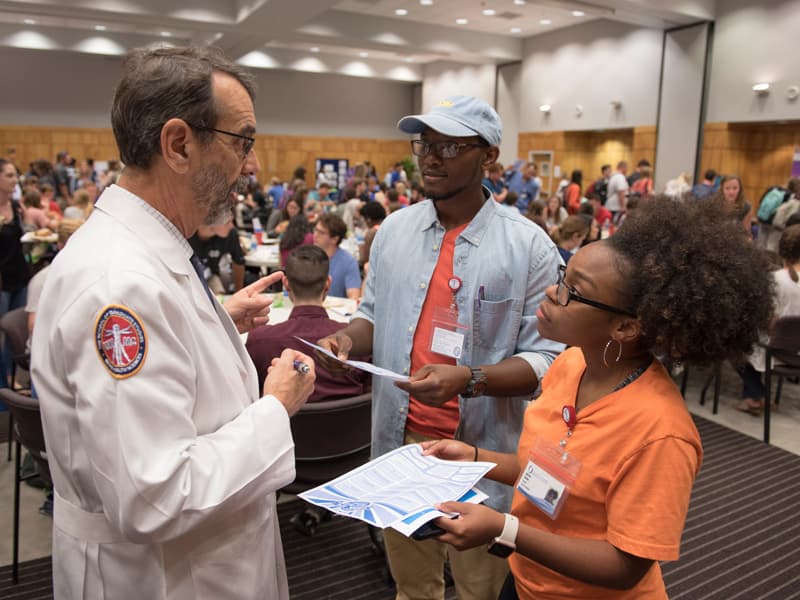
A single line in a resume or curriculum vitae may not fully convey the hard work that has been put into achieving a special certification or professional development. With the University of Mississippi Medical Center’s rollout of digital credentialing at the Interprofessional Campus Welcome held last Friday, it very well can.
The introduction of digital credentialing to the campus is a joint effort between the Office of Academic Affairs, the Office of eCampus, a department that was created two years ago to oversee all online education at UMMC, and the Division of Information Systems.
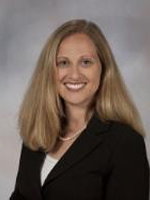
What then is digital credentialing?
“Essentially, it is an electronic token or an electronic icon that exists somewhere online as a way to acknowledge a type of achievement that is earned by someone,” said Heidi Shoemake, senior IT program manager in DIS. “Really, the credential is just a vehicle to tell people about the skills you have.”
Dr. David Fowler, director of the Office of eCampus in the Office of the Vice Chancellor for Academic Affairs and chair of the eCampus Advisory committee, said that Shoemake, Elizabeth Jacobs and their team in DIS have been instrumental in bringing about the digital credentialing initiative.

Where the digital credential adds value to a resume is in the amount of information embedded in the icon or badge that serves as a graphical representation of the credential. When clicked in the digital environment, the badge provides a wealth of information to the interested party, such as the specific criteria required for earning the credential and the methods of assessment used to determine competency in the skill.
“There is a richness in the information that is tied to that credential that isn’t available when you get a certificate that’s on a piece of paper,” said Shoemake.
The NextGen Ed campus group, which works to bring innovation into the educational process on campus, oversaw last year the pilot program offering digital credentials for faculty participating in Quality Matters certification in the School of Health Related Professions and the School of Nursing.
“We started with faculty because we were really interested in getting their perception,” said Shoemake. “If they didn't see value in it, they weren't going to utilize it for their students.”
The pilot was a success. Initially, the idea was to use digital credentialing only for the schools and education side of the Medical Center, but the eCampus committee saw the possibilities available with using the platform throughout the enterprise.
“It’s for students, faculty and all employees and staff,” Fowler said. “We hope faculty will see that this will be very useful as they build their professional portfolios and that they will see the value of using credentials to demonstrate their level of expertise either in clinical, educational or research areas.”
Digital credentials will be available in seven categories: faculty professional development, staff professional development, student development, academic credit, clinical skills development, simulation credentials, and continuing education programs provided by the Division of Continuing Health Professional Education.
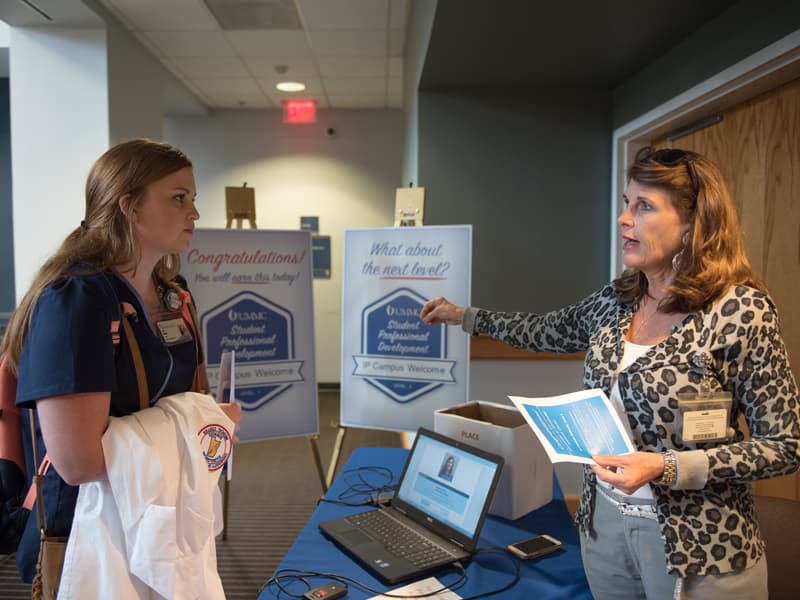
For the Interprofessional Campus Welcome, first-year students from all seven schools on campus came together to learn about opportunities for interprofessional training and activities that they will need to take part in throughout their time at the Medical Center. That includes interprofessional training components in curricula that have become a requirement for academic institutions seeking accreditation. These students will be the first on campus to have a digital credential on their resume.
Rob Barber, a first-year medical student from Hernando who took part in the welcome event, said that when he was introduced to digital credentialing, he saw it as a way to equip himself outside of the classroom.
“It gives you the tools to set yourself apart in your professional and career development,” he said. “I was excited to have my graduate school offer me the opportunities to succeed in the future.”
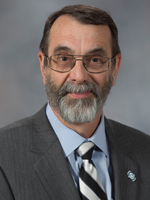
“The idea of moving this campus into that digital space, taking us out of the pen and parchment documentation of accomplishments, has been one that has had a lot of allure to me from the very beginning,” said Dr. Rob Rockhold, deputy chief academic officer and professor of pharmacology and toxicology.
“A paper certificate or a line on a printed piece of paper in a CV tells you nothing about what you had to do to gain that credential. It has no intrinsic value in itself,” he said. “The digital credential has that intrinsic value. Embedded in every digital credential is the process or the steps that you had to accomplish to be able to gain that particular designation. That is the real value of digital credentials.”
First-year radiological sciences student Alex Wilcher, of Union, also sees the value digital credentials give for prospective employers looking at one’s resume. “You can tell somebody all day long what you have, and they might not actually understand what that offers,” she said. Looking at the digital credential, employers will “understand what you had to do.”
Rockhold said that the team has worked diligently to ensure that a process of checks and balances validates the digital credential, giving it academic integrity.
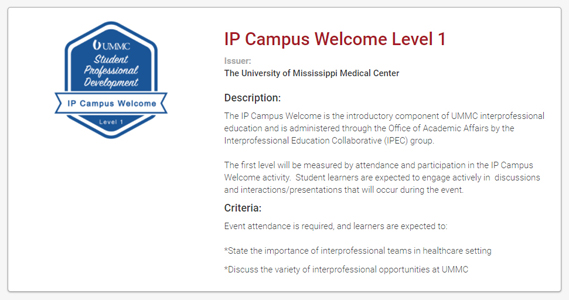
“These are not merit badges,” he said. “They are electronic indicators of competence in a particular skill or learning activity that has been vetted through the academic process.”
Rockhold said that introducing digital credentialing with the Interprofessional Campus Welcome actively supports the Vice Chancellor's vision for UMMC as providing an interprofessional team approach to improving the health of Mississippians.
“So I think we are advancing on two very important fronts,” Rockhold said. “One is the educational innovation, and the other is advancing the mission espoused by our leader. I'm delighted that we are able to pull those two things together.”
In the coming weeks, look for a web portal on the eCampus web page that will allow faculty and staff to submit training opportunities to be vetted for digital credentials. Until then, those interested may contact Elizabeth Jacobs at cjacobs@umc.edu.
Visit UMMC’s Credly.com enterprise site to see what digital credentials are currently offered at the Medical Center.

